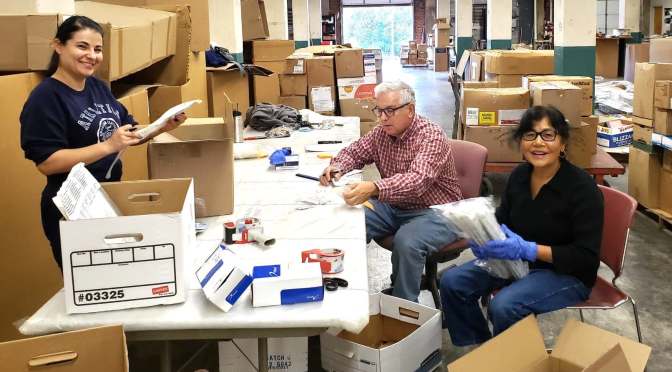When Champa and I returned to Durham after serving abroad for two years in the Peace Corps, I didn’t expect it to be so difficult to continue volunteering in my own community.
I assumed there were local nonprofit groups that could use my professional skills, especially for free. When I called around and searched online, though, I couldn’t find a good match.  Eventually, I created an informal volunteer role for myself with the North Carolina partnership program that assists Moldova, where we served as Peace Corps volunteers, and I resumed volunteering at Urban Ministries, but who knows what I missed?
Eventually, I created an informal volunteer role for myself with the North Carolina partnership program that assists Moldova, where we served as Peace Corps volunteers, and I resumed volunteering at Urban Ministries, but who knows what I missed?
I am not alone. Across the Triangle and more widely, many older Americans now view retirement as much more than leisure. They consider it a second act, a new life stage of personal growth and service that may last for decades. These retirees are still sharp, still active, and a tremendous potential resource for nonprofit organizations that could tap their expertise in various fields.
Too often, however, communities regard their older residents in an outdated way — as a group requiring assistance rather than as an asset to recruit and empower.
I became curious about what I encountered and began talking with people in our area who are involved in one way or another with older adults or volunteering.  Over the past few months, I’ve met with our local volunteer center, Activate Good, the United Way, the Osher Lifelong Learning Institute at Duke, Duke’s Office of Durham and Regional Affairs, local senior centers, the governor’s office, county officials, a retirement community and many others. (Here’s a list.) I’ve also talked with Encore.org and people around the country.
Over the past few months, I’ve met with our local volunteer center, Activate Good, the United Way, the Osher Lifelong Learning Institute at Duke, Duke’s Office of Durham and Regional Affairs, local senior centers, the governor’s office, county officials, a retirement community and many others. (Here’s a list.) I’ve also talked with Encore.org and people around the country.
These are wonderful and impressive people — caring, thoughtful and professional. They are working hard on missions such as helping retirees obtain medical care or promoting volunteerism broadly.
Generally, though, older volunteers are only a small part of their missions, which were established before the big shift began in how Americans think about retirement.
For instance, our local volunteer center does great work but is also busy with high school students and many others. Websites such as VolunteerMatch and organizations ranging from AARP to RSVP serve important roles, too. Sixty+Me has an excellent online guide. Yet many older residents still fail to connect with worthy organizations that could benefit from their experience in writing grants, preparing budgets, building websites or managing staffs.
 To be sure, many retired citizens do serve as volunteers — teaching literacy classes, building homes with Habitat for Humanity and much more. Some volunteer through their religious organization or a former employer. Many retirement communities and senior centers have their own volunteer programs, often with a focus on serving the needs of other retired people.
To be sure, many retired citizens do serve as volunteers — teaching literacy classes, building homes with Habitat for Humanity and much more. Some volunteer through their religious organization or a former employer. Many retirement communities and senior centers have their own volunteer programs, often with a focus on serving the needs of other retired people.
We need to be more strategic about this, as some communities around the country have demonstrated. A leader of the Encore Boston Network told me about their system to train older volunteers, match them with organizations and provide ongoing support. He described similar efforts in Phoenix, Denver and elsewhere. Many of the volunteers take on assignments that draw on their special expertise. Springfield, Missouri has an impressive Give 5 program that brings groups of retired people on a bus to local nonprofits, helping them find one to match their interests.

I don’t mean in any way to downplay the many people, of all ages, who are generously rolling up their sleeves across our region to deliver meals, comfort the sick and more, or the excellent organizations that work with them. But as more and more older Americans look for new meaning in their lives, communities like Durham that attract them should recognize their good fortune and act deliberately to match them in meaningful volunteer roles, which would also help retirees avoid social isolation.
The opportunity is compelling and I am optimistic we can take advantage of it. As I’ve discussed it with local leaders and stakeholders, they’ve generally been responsive and enthusiastic. They see the possibilities. Several key players are interested in trying to make Durham a leader in this arena. Everything I’ve encountered so far reminds me why Champa and I are lucky to live in such a progressive and caring community.
If some older folks prefer to just play golf or tend their gardens, they’ve earned that choice. The two of us enjoy traveling and spending time with our grandchildren, too. But we also want to continue the spirit of volunteerism we found so fulfilling in the Peace Corps.
We’re not the only ones. Put us to work.




This is so needed! I’m looking for these sorts of opportunities, too.
LikeLike